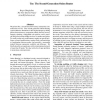Free Online Productivity Tools
i2Speak
i2Symbol
i2OCR
iTex2Img
iWeb2Print
iWeb2Shot
i2Type
iPdf2Split
iPdf2Merge
i2Bopomofo
i2Arabic
i2Style
i2Image
i2PDF
iLatex2Rtf
Sci2ools
130
click to vote
USS
2004
2004
Tor: The Second-Generation Onion Router
We present Tor, a circuit-based low-latency anonymous communication service. This second-generation Onion Routing system addresses limitations in the original design by adding perfect forward secrecy, congestion control, directory servers, integrity checking, configurable exit policies, and a practical design for location-hidden services via rendezvous points. Tor works on the real-world Internet, requires no special privileges or kernel modifications, requires little synchronization or coordination between nodes, and provides a reasonable tradeoff between anonymity, usability, and efficiency. We briefly describe our experiences with an international network of more than 30 nodes. We close with a list of open problems in anonymous communication. 1 Overview Onion Routing is a distributed overlay network designed to anonymize TCP-based applications like web browsing, secure shell, and instant messaging. Clients choose a path through the network and build a circuit, in which each node (o...
| Added | 31 Oct 2010 |
| Updated | 31 Oct 2010 |
| Type | Conference |
| Year | 2004 |
| Where | USS |
| Authors | Roger Dingledine, Nick Mathewson, Paul F. Syverson |
Comments (0)

